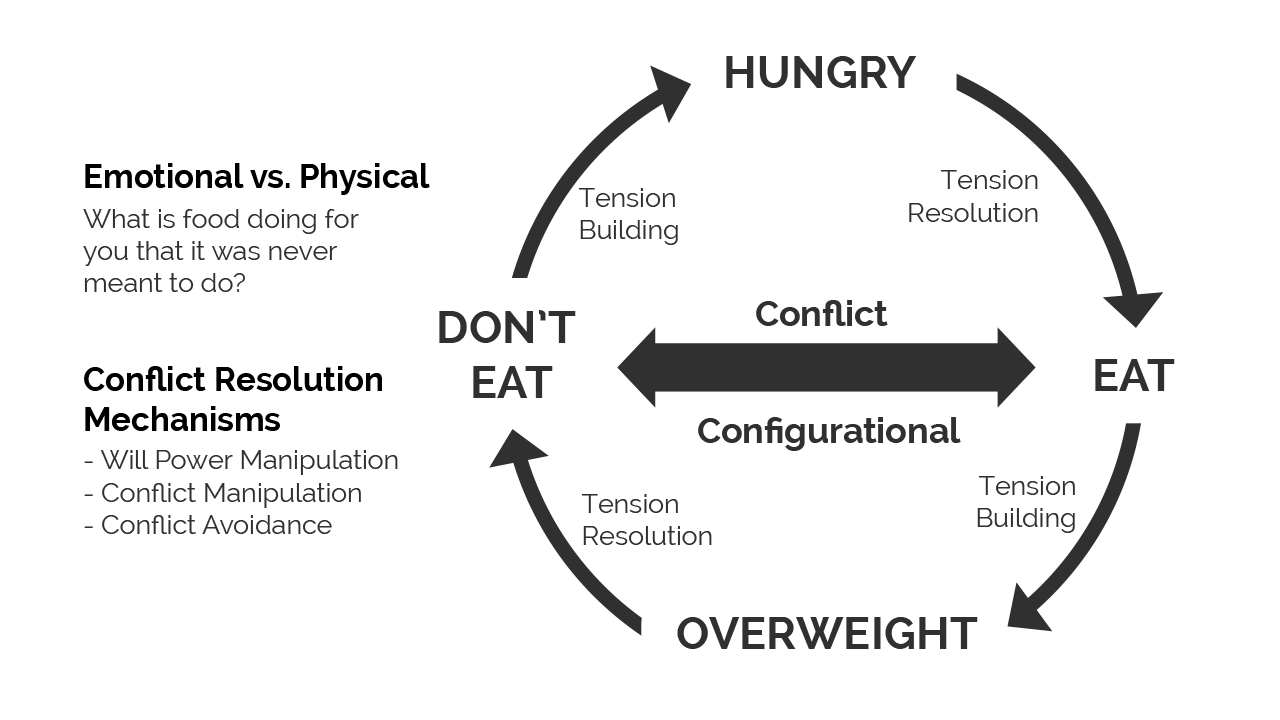Achieving your ideal weight offers unique opportunities and difficult challenges. Food is your most consistent, dependable and enduring relationship. When you transform your relationship with food, you transform your life. Food, for many of you, is your relationship of last resort; it is your oldest and most predictable friend. You can completely isolate yourself and withdraw from every relationship. You can quit smoking or stop drinking alcohol and your life will improve. You cannot quit eating. You must repair the relationship. Let’s discuss how.
Obesity rates hit an all-time high in 2015-2016 at 39.6%, with 74.1% of Americans being overweight or obese. Weight loss related searches are the number four and the number ten “how to” Google searches. On the bright side, this is the first time in history where more people will die of complications from obesity than will die of starvation. I am not making light of a serious issue. The question is: How do we live a healthy life in a society, where for the first time in history, there is an abundance of food?
The Challenge
Food is great at immediately filling a void. Physical hunger creates a void which can also be described as tension. Tension always seeks resolution. When you eat for physical hunger and stop when you are satisfied, this is a healthy way to fill a void. This is a sustainable tension-resolution mechanism. When you try to fill other types of voids with food, this is when you get in trouble.
Another, and often overlooked, challenge is fulfilling your opposing needs: variety and consistency. Tony Robbins drives this point home when he discusses the six basic human needs. The first two of the six are the need for consistency and the need for variety. When things are too consistent, we get bored. When there is too much variety, we get stressed. When one thing fulfills both needs at the same time, it can become an addiction. There is nothing on Earth better at providing consistency and variety simultaneously than food!
Food can also fulfill the need for love and recognition. Growing up, food represented both in my family. Eating was always a robust family and social event. You also got recognized for eating the most or finishing your plate. “Stevie boy you are a good eater!” (No one is allowed to call me Stevie, except my mother). And of course, Nan got recognized for being such a great cook. This is similar in many homes and many cultures. Most of us have a complex relationship with food. This awareness is the first step toward transforming your life.
Filling the Void
The challenge with food is that we try to make it do things it was never meant to do. Many, if not all of us, have at least some level of emotional void. There is no amount of food that can help loneliness, overcome boredom, lift you out of depression or deliver you from despair. The empty feelings of these emotional states cannot be filled with food. Eating to soothe these holes only make them worse. Being overweight or obese worsens the issues that overeating is trying to fix. This is the root of addiction.
Conflict Management
This cycle of emotional eating creates a classic conflict pattern, accurately described by Robert Fritz. There are two basic paths in life: one that leads you forward and another that has you going in circles. He calls the forward path “structural tension,” and the circular path is referred to as structural conflict. On the second path, you waste all your creative energy trapped in conflict and conflict management. We experience conflict in our health, relationships and finances.
By far, the most common conflict pattern is dieting. People are typically overweight due to some unnatural tension-resolution mechanism, such as eating for emotional reasons. Unfortunately, this is most people’s relationship with food.
When you are hungry, you relieve this tension by eating. If you are overweight, you reduce this tension by not eating. You cannot eat and not eat at the same time. This leads to a life of conflict management, yo-yo dieting and fad diets, rather than consciously and deliberately creating your ideal weight.
Conflict diverts you from what is most important in life. Conflict is the thief that steals your health, wealth and happiness. Most people have given up being thin, in-shape, and healthy and live in a narrow range of tolerable conflict.
In our article Conflict Management, we go deeply into the mechanisms we use to manage conflict. Robert Fritz describes them all as:
1. Willpower manipulation: This never works. You cannot get yourself to do something you don’t want to do, at least not for long. People good at will power manipulation will typically have huge swings. They will lose 50 pounds, keep it off for a while, and then gain back 60. This is exhausting and eventually they migrate to conflict avoidance.
2. Conflict manipulation: This is typified by yo-yo or fad dieting. You lose weight for an upcoming event. As soon as the event is over you gain all the weight back (and more). The Definitive Guide to Alternative Medicine reports that most people actually gain weight on a diet.
3. Conflict avoidance: This is the most common method of dealing with conflict. Conflict avoidance is when you have given up and live in a narrow range of tolerable conflict. These patterns drain creative energy, and eventually, most people give up. They settle for a limited life in a narrow range of tolerable conflict. This, in my opinion, is the greatest human tragedy. All that potential, gobbled up in structural conflict.
Robert Fritz accurately points out that if you are stuck in a structural conflict, the harder you work the worse it gets. You must learn to bypass conflict, create your life and control the limiting emotions that are causing the conflict.
Bypass the Conflict
You essentially have two choices in life: Live with conflict management or create your life. You can spend years on the couch, exploring all your limiting emotions, or you can recreate your life.
In my experience, the creative process is the most expedient and effective way to identify and deal with limiting emotions. It sets the stage to move your life forward.
Another analogy Robert Fritz uses is the rocking chair. If you are sitting in a rocking chair, no matter how hard you work, how smart you are, or how many people are helping you, you will never move forward. Most people are wasting all their creative energy in this metaphorical rocking chair. The structure of their thoughts and feelings won’t allow them to move forward. You must change the structure by getting out of the rocking chair. This is not easy; we live in a world filled with conflict and people obsessed with conflict management. It is time for us to get out of the rocking chair, end the conflict and consciously create our lives.
Creating a Life
The creative process allows you to move forward while you identify the limiting emotions that cause you to overeat. The Creative Process Workbook takes a deep dive into this process. When you create a compelling ideal-weight vision, all the emotional issues that are keeping you stuck, come to the surface. You can manage these challenges, or you can overcome and bypass them. The creative process allows you to overcome and bypass them. You will transform your level of thinking so that they don’t exist as a problem for you any longer. This is an exciting process because you immediately see a light at the end of the tunnel. You see a permanent and predictable way forward. This is the process of transformation.
Conscious Eating
In the Recreation Handbook-The Ultimate Guide to Mindfulness, our most important chapter is Conscious Eating. Every meal, every snack and every indulgence, is an opportunity to learn about yourself. Instead of managing the problem, you are identifying the solution. Even if you indulge, you will learn something about yourself; that’s exciting. When you are conscious, you will not hurt yourself.
Summary
I am sure you noticed that we did not mention one thing about diet plans or nutrition. Achieving your ideal weight is about transforming your relationship with food. It is about creating the images in your mind that allow you to easily create the body you deserve.
There are a multitude of diet plans and nutritional experts, and there are certainly some basics everyone needs to know. In this age of information, knowledge is almost never the problem; it is always mindset.
The key to your success will be bypassing the conflict and transforming your relationship with food. This is the only predictable and permanent way to lifelong success. Achieving your ideal weight is the greatest opportunity of your life.
Dr. Steven Cangiano began his college career with aspirations to become a high school teacher. These aspirations took a turn when he decided to follow in his father’s footsteps and go into the field of podiatric surgery. He completed his medical school training at Temple University and his surgical residency at the NY College of Podiatric Medicine where he was chief resident. He continued his academic career and fulfilled his early teaching aspirations by becoming an assistant professor of surgery at the age of 27. He was board certified in foot and ankle surgery at the age of 28. As residency director of the Franciscan Health System of NJ, Dr. Cangiano grew the program into the largest in NJ. Dr. Cangiano published multiple articles in medical journals and spent a total of thirteen years in academic medicine before venturing off into the world of complementary medicine.





